虚拟语气完整讲解
- 格式:pptx
- 大小:913.24 KB
- 文档页数:45

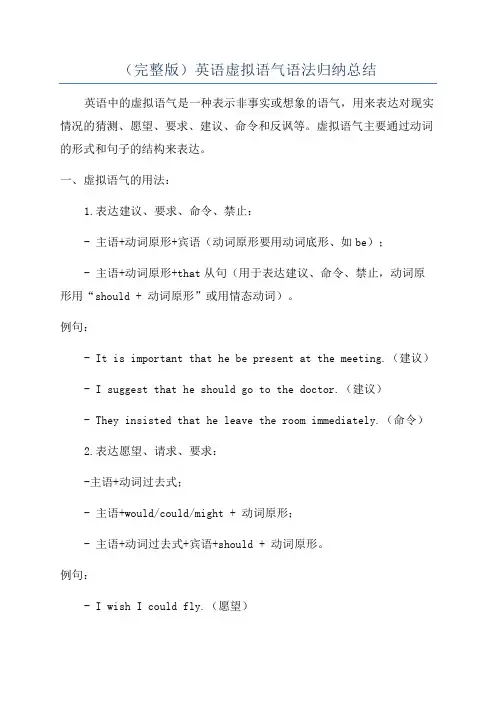
(完整版)英语虚拟语气语法归纳总结英语中的虚拟语气是一种表示非事实或想象的语气,用来表达对现实情况的猜测、愿望、要求、建议、命令和反讽等。
虚拟语气主要通过动词的形式和句子的结构来表达。
一、虚拟语气的用法:1.表达建议、要求、命令、禁止:- 主语+动词原形+宾语(动词原形要用动词底形、如be);- 主语+动词原形+that从句(用于表达建议、命令、禁止,动词原形用“should + 动词原形”或用情态动词)。
例句:- It is important that he be present at the meeting.(建议)- I suggest that he should go to the doctor.(建议)- They insisted that he leave the room immediately.(命令)2.表达愿望、请求、要求:-主语+动词过去式;- 主语+would/could/might + 动词原形;- 主语+动词过去式+宾语+should + 动词原形。
例句:- I wish I could fly.(愿望)- I would appreciate it if you could help me.(请求)3.表示虚拟条件:- If条件从句中的谓语动词用过去完成时,主句用would/should/might/could + have + 过去分词;- If条件从句中的谓语动词用过去时,主句用would/should/could + 动词原形。
例句:- If I had known his phone number, I would have called him.(虚拟条件)- If you had listened to me, we could have finished the project earlier.(虚拟条件)4.表达建议、要求、祝愿:- If only内部称述 + 主语 + 过去式。
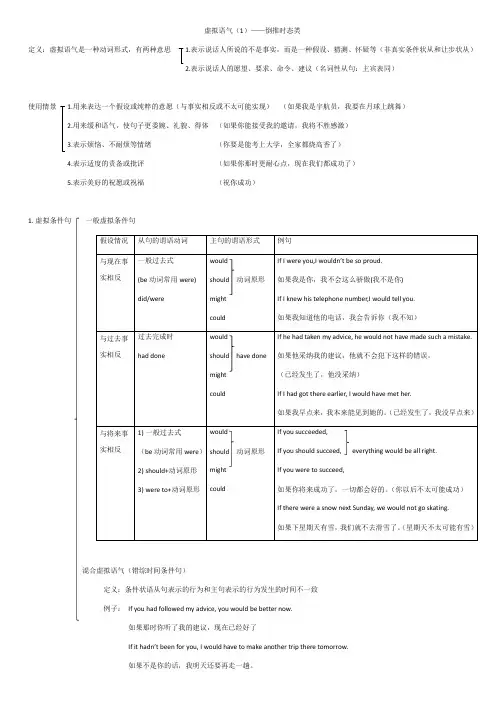
虚拟语气(1)——倒推时态类定义:虚拟语气是一种动词形式,有两种意思 1.表示说话人所说的不是事实,而是一种假设、猜测、怀疑等(非真实条件状从和让步状从)2.表示说话人的愿望、要求、命令、建议(名词性从句:主宾表同)使用情景 1.用来表达一个假设或纯粹的意愿(与事实相反或不太可能实现)(如果我是宇航员,我要在月球上跳舞)2.用来缓和语气,使句子更委婉、礼貌、得体(如果你能接受我的邀请,我将不胜感激)3.表示烦恼、不耐烦等情绪(你要是能考上大学,全家都烧高香了)4.表示适度的责备或批评(如果你那时更耐心点,现在我们都成功了)5.表示美好的祝愿或祝福(祝你成功)1.虚拟条件句一般虚拟条件句混合虚拟语气(错综时间条件句)定义:条件状语从句表示的行为和主句表示的行为发生的时间不一致例子:If you had followed my advice, you would be better now.如果那时你听了我的建议,现在已经好了If it hadn’t been for you, I would have to make another trip there tomorrow.如果不是你的话,我明天还要再走一趟。
If you had studied hard before,you would be a college student now.如果你以前努力学习的话,你现在就是大学生了。
省略+倒装当虚拟条件句的谓语动词中含有were,should,had时,if可以省略,并将were,should,had提前于句首,变为倒装句。
如果虚拟条件句是否定句,not 保留在原处If he should agree to go there, we should send him there.= Should he agree to go there,we should send him there.If she were there,she would agree with us.= Were she were, she would agree with us.If he had learnt about computers,we would have hired him.= Had he learnt about computers,we would have hired him.含蓄虚拟条件句定义:有时为了表达的需要,在虚拟语气中并不总是出现if引导的条件状语从句,而是通过其他手段来代替条件从句分类:1) but for....=(If it+be not for) ;without;Without your help ,we couldn’t have finished the work ahead of time.= But for your help,we couldn’t have finished the work ahead of time.= If it hadn’t been for your help,we couldn’t have finished the work ahead of time.没有你的帮助,我们不可能完成任务。
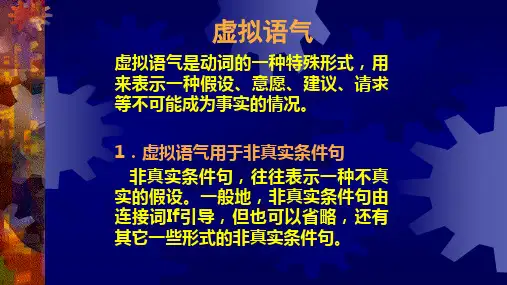
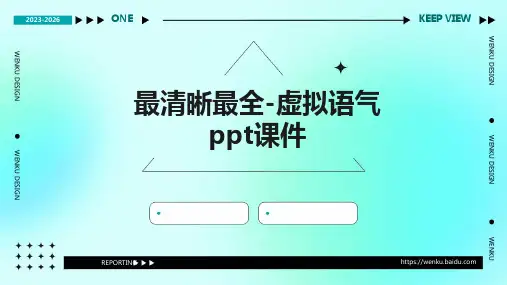
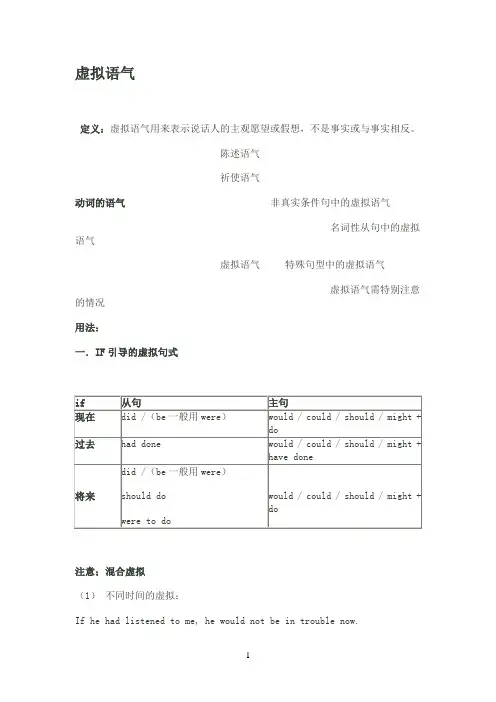
虚拟语气定义:虚拟语气用来表示说话人的主观愿望或假想,不是事实或与事实相反。
陈述语气祈使语气动词的语气非真实条件句中的虚拟语气名词性从句中的虚拟语气虚拟语气特殊句型中的虚拟语气虚拟语气需特别注意的情况用法:一.IF引导的虚拟句式注意;混合虚拟(1)不同时间的虚拟:If he had listened to me, he would not be in trouble now.If he had told me yesterday, I should know what to do now.(2) 虚拟与陈述的混合:He could have passed the exam, but he wasn’t careful enough. You should have come earlier, the bus left a moment ago.二.名词性从句中的虚拟语气:从句谓语动词(should) +do1.主语从句:it is + adj + that结构2.宾语从句:主语+要求接虚拟语气的动词+that一个坚持:insist两个命令:order; command 两个决定:decide; determine三个建议:suggest; advise; propose四个要求:demand; ask; request; require注意:① suggest:暗示;insist:坚持说(不虚拟)② except, believe, think suspect等动词的否定形式或疑问句后面的宾语从句要用虚拟。
I never thought that he should be such a brave young solider③ should竟然I am glad that your novel should have won the first prize.④ wish引导从句的虚拟语气,谓语动词变化和if从句虚拟语气一样。
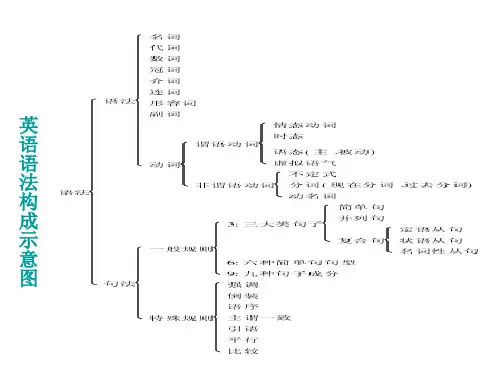
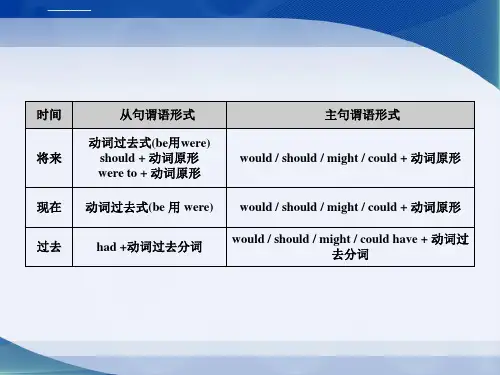
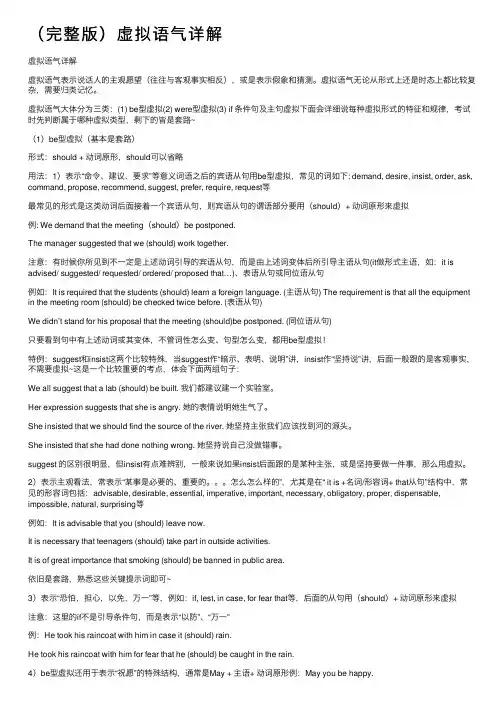
(完整版)虚拟语⽓详解虚拟语⽓详解虚拟语⽓表⽰说话⼈的主观愿望(往往与客观事实相反),或是表⽰假象和猜测。
虚拟语⽓⽆论从形式上还是时态上都⽐较复杂,需要归类记忆。
虚拟语⽓⼤体分为三类:(1) be型虚拟(2) were型虚拟(3) if 条件句及主句虚拟下⾯会详细说每种虚拟形式的特征和规律,考试时先判断属于哪种虚拟类型,剩下的皆是套路~(1)be型虚拟(基本是套路)形式:should + 动词原形,should可以省略⽤法:1)表⽰“命令、建议、要求”等意义词语之后的宾语从句⽤be型虚拟,常见的词如下: demand, desire, insist, order, ask, command, propose, recommend, suggest, prefer, require, request等最常见的形式是这类动词后⾯接着⼀个宾语从句,则宾语从句的谓语部分要⽤(should)+ 动词原形来虚拟例: We demand that the meeting(should)be postponed.The manager suggested that we (should) work together.注意:有时候你所见到不⼀定是上述动词引导的宾语从句,⽽是由上述词变体后所引导主语从句(it做形式主语,如:it is advised/ suggested/ requested/ ordered/ proposed that…)、表语从句或同位语从句例如:It is required that the students (should) learn a foreign language. (主语从句) The requirement is that all the equipment in the meeting room (should) be checked twice before. (表语从句)We didn’t stand for his proposal that the meeting (should)be postponed. (同位语从句)只要看到句中有上述动词或其变体,不管词性怎么变、句型怎么变,都⽤be型虚拟!特例:suggest和insist这两个⽐较特殊,当suggest作“暗⽰、表明、说明”讲,insist作“坚持说”讲,后⾯⼀般跟的是客观事实,不需要虚拟~这是⼀个⽐较重要的考点,体会下⾯两组句⼦:We all suggest that a lab (should) be built. 我们都建议建⼀个实验室。
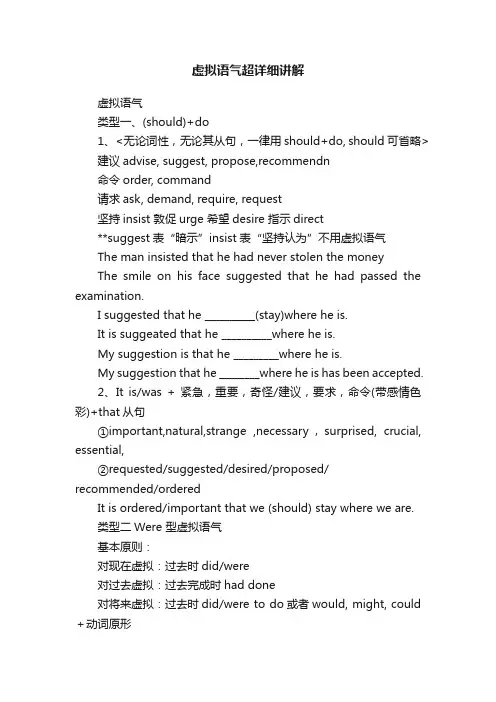
虚拟语气超详细讲解虚拟语气类型一、(should)+do1、<无论词性,无论其从句,一律用should+do, should可省略>建议advise, suggest, propose,recommendn命令order, command请求ask, demand, require, request坚持insist 敦促urge 希望desire 指示direct**suggest表“暗示”insist表“坚持认为”不用虚拟语气The man insisted that he had never stolen the moneyThe smile on his face suggested that he had passed the examination.I suggested that he __________(stay)where he is.It is suggeated that he __________where he is.My suggestion is that he _________where he is.My suggestion that he ________where he is has been accepted.2、It is/was + 紧急,重要,奇怪/建议,要求,命令(带感情色彩)+that从句①important,natural,strange ,necessary,surprised, crucial, essential,②requested/suggested/desired/pro posed/ recommended/orderedIt is ordered/important that we (should) stay where we are.类型二Were 型虚拟语气基本原则:对现在虚拟:过去时did/were对过去虚拟:过去完成时had done对将来虚拟:过去时did/were to do或者would, might, could +动词原形1. if 条件句中的虚拟时间从句谓语形式主句谓语形式将来动词过去式(be用were)should + 动词原形were to + 动词原形would / should / might / could + 动词原形现在动词过去式(be 用were) would / should / might / could + 动词原形过去had +动词过去分词would / should / might / could have + 动词过去分词1.1 与现在事实不一致,其句型为:If +主语+did ,主语+should (could, would, 或might )+do .If I were you, I would study hard. (可倒装)If it rained, I would not be here now.1.2 与过去事实不一致,句型为:If +主语+had +done ,主语+should (could, would, 或might )+have +done. If the doctor had come last night, the boy would have been saved. (可倒装)1.3 将来事实不一致,句型为:If should were to 主语++do ,主语+should (could ,would, 或might )+do. If it should rain tomorrow, we would stay at home.(可倒装)If I were to go to the moon one day, I could see it with my own eyes.(可倒装) If you missed the film to night, you would feel sorry.(混合虚拟)难点:①在条件句中如果出现were, had, should 可省去if ,将主语与这些词倒装 Had the doctor come last night , the boy would havesaved.Were I to go to the moon one day , I would see it with my own eyes.Should it rain tomorrow , we would stay at home.②当条件状语从句表示的行为和主句表示的行为所发生的时间不一致时,被称为“错综时间条件句”,常常表现为if+过去虚拟+主句现在虚拟If you had followed my advice, you would be better now.If you had studied hard before, you would be a college student now.2. wish 后面的宾语从句中与现在愿望不一致: 主语+did ; I wish I were you.与过去愿望不一致: 主语+had +done ;I wish I had visited the white House when I was in the states.与未来愿望不一致: 主语+would (could )+do 。
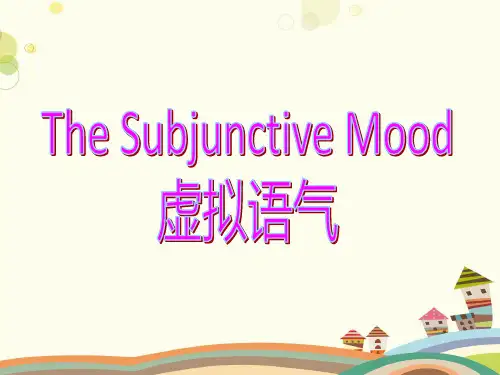
高考英语语法复习虚拟语气知识讲解一、基础知识(一)什么是虚拟语气谓语动词的作用不仅可以表示动作的时间、状态、假设(情感),也是一种语气(mood)的表现形式,表明说话的目的和意图。
(语气包含陈述语气、祈使语气、虚拟语气、疑问语气)虚拟语气用于表示假设、愿望、建议、命令等非真实或虚拟的情况,即与真实相反。
上学的时候老师经常举的一个例子,"If I were you"因为我不可能是你,这是一种不可能存在的事实,所以这是个虚拟语句。
总而言之英语中的虚拟语气可以分为两大体系:一是表示与事实相反的,或者是假象的情形,通常由if引导,叫做虚拟条件句;另一个体系是在名词从句中使用虚拟语气,表示建议,命令或者要求等语气,类似于上述美剧常用的台词。
(二)虚拟语气的用法这一部分我们主要用虚拟语气在条件句中的用法作为讲解不同情况条件从句谓语主句谓语使用场景与过去事实相反If+主语+haddone主语+should/would/could/might+have done既然是过去了,那么谈到的一切情况都已既成事实,所以过去虚拟表达的是一个与过去事实相反的情形与现在事实相反If+主语+did(be动词用were)主语+should/would/could/might+do既可能是事实,也可能是假设条件。
因此,假设条件句和事实相反句适用于谈现在的情况与将来事实相反If+主语+ did(be动词用were)If+主语+ wereto + doIf+主语+should+ do主语+should/would/could/might+do对于将来时间的虚拟不可能以事实为基础,而只能是表达说话人的一个设想或愿望。
所以,对于将来的虚拟只适用于假设条件句,而不可能表达一个与事实相反的虚拟与现在事实相反:If I had a map, I would lend it to you.如果我有地图我就借给你。
(但我没有)与将来事实相反:If I were to do the job, I would do it in a different way. 要是我来做这工作,我会是另一种做法。
虚拟语气一、考点聚焦1、虚拟语气用于条件状语从句中(1)表示与现在事实相反的假设,条件状语从句中的谓语动词用“过去式(be动词的过去式用were)”,而主句中的谓语动词用“would / should/ could / might + 动词原形”。
如:If I were a boy, I would join the army.If the had time, she should go with you.(2)表示与过去的事实相反,条件状语从句中的谓语动词用过去完成时,主句中的谓语动词则用“would / should / might / could + have +过去分词”。
如:If he had taken my advice, he would have succeeded in the competition.(3)表示与将来事实相反,条件状语从句中的谓语动词一般过去时或should(were to) + 动词原形,而主句中的谓语动词则用would / should/could might + 动词原形。
如;If it were to rain tomorrow, the football match would be put off.(4)当条件状语从句表示的行为和主句表示的行为所发生的时间不一致时,动词的形式要根据它所表示的时间作相应调整。
如:If they had worked hard, they would be very tired.(从句说的是过去,主句指的是现在)Were I a boy, I would join the army.Had he taken my advice, he would have succeeded.Were it not for the expense, I would go to Britain.2、虚拟语气用于名词性从句(1)虚拟语气在宾语从句中的运用。
英语的虚拟语气知识点讲解一、虚拟语气的概念。
虚拟语气是一种特殊的动词形式,表示所说的话不是事实,而是一种假设、愿望、怀疑、推测或与事实相反的情况等。
二、虚拟语气在非真实条件句中的用法。
1. 与现在事实相反。
- 条件从句的谓语动词用一般过去式(be动词一般用were),主句的谓语动词用“should/would/could/might + 动词原形”。
- 例如:If I were you, I would take an umbrella.(实际上我不是你)2. 与过去事实相反。
- 条件从句的谓语动词用“had + 过去分词”,主句的谓语动词用“should/would/could/might+have +过去分词”。
- 例如:If he had taken my advice, he would have passed the exam.(实际上他没听我的建议,也没通过考试)3. 与将来事实相反。
- 条件从句的谓语动词有三种形式:一般过去式、“should+动词原形”、“were to+动词原形”,主句的谓语动词用“should/would/could/might +动词原形”。
- 例如:If it rained/were to rain/should rain tomorrow, we would not go out.三、虚拟语气在宾语从句中的用法。
1. wish后的宾语从句。
- 表示与现在事实相反的愿望,从句谓语动词用一般过去式(be动词用were)。
例如:I wish I were a bird.(实际上我不是鸟)- 表示与过去事实相反的愿望,从句谓语动词用“had+过去分词”。
例如:Iwish I had seen the film yesterday.(实际上昨天没看这部电影)- 表示与将来事实相反的愿望,从句谓语动词用“would/could/might+动词原形”。
例如:I wish I could fly to the moon tomorrow.2. 在表示建议、要求、命令等意义的动词后的宾语从句中(如suggest, advise, demand, require, order等)- 从句谓语动词用“should+动词原形”,should可以省略。